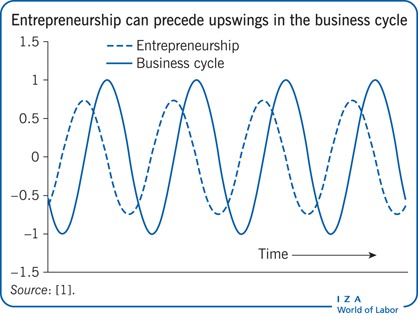Elevator pitch
Entrepreneurship has a cyclical component, raising two questions. Is the entrepreneurship cycle related to the business cycle? And is there causality? A two-way relationship between entrepreneurship and the business cycle would be in line with the two faces of entrepreneurs: as agents of change creating upswings (opportunity entrepreneurship) and as rational actors escaping unemployment by setting up a business (necessity entrepreneurship). Nascent entrepreneurship can indeed be precyclical, implying that the two faces of entrepreneurship also show up in the business cycle, with promising policy implications.
Key findings
Pros
Opportunity nascent entrepreneurship is precyclical in the business cycle.
In recessions the innovations of start-ups can boost the economy.
Entrepreneurship can have some predictive power over the business cycle since owning a business signals trust in future economic conditions.
An upswing in opportunity nascent entrepreneurship may advance an upswing in the business cycle.
Policies aimed at stimulating entrepreneurship could influence the business cycle.
Cons
Unlike opportunity nascent entrepreneurship, necessity nascent entrepreneurship is not precyclical, nor is it correlated with fluctuations in the business cycle.
In the booming phase of the economy, entrepreneurs become hesitant.
There are no empirical studies examining causation.
The hypothesis of precyclicality does not imply causation, for entrepreneurs may merely foresee and react to the course of the business cycle rather than cause it.
